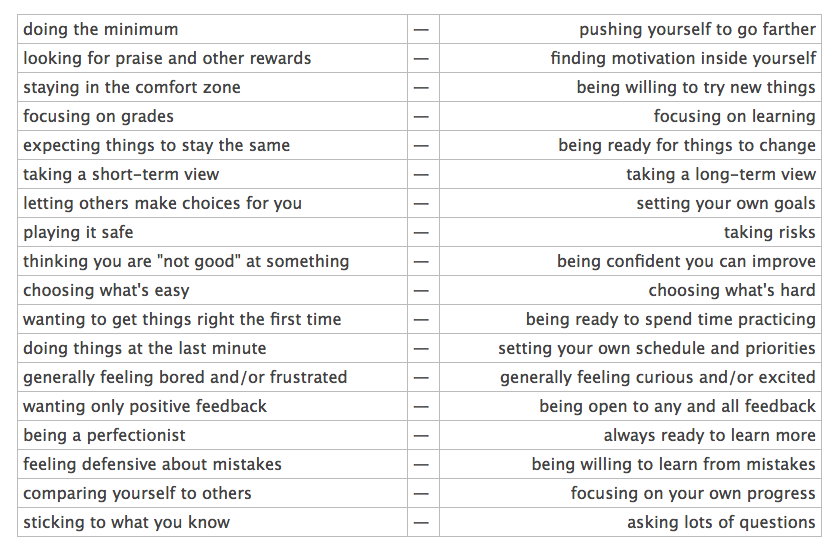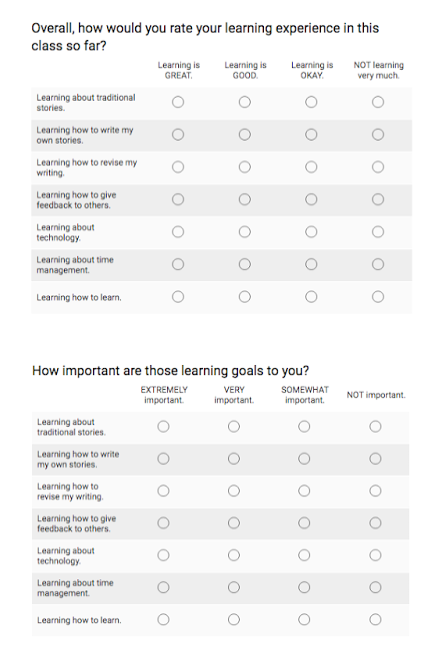Mid-Semester Evaluation and Feedback
- Subscribe to RSS Feed
- Mark as New
- Mark as Read
- Bookmark
- Subscribe
- Printer Friendly Page
- Report Inappropriate Content
CROSSPOSTED. Updates will appear at Teaching with Canvas blog. I've posted this in the Instructional Designers group, but it would be the kind of post that I would otherwise put into a Connected Learning group if we can get something like that here at Canvas. Interest? Please vote for a Connected Learning group! 🙂
~ ~ ~
Next week (Week 8 of our semester) is a Review Week in my classes. The review is NOT because we have a test or exam to review for, but because reviewing and reflecting are essential for learning. Plus, I need feedback! I've written elsewhere about feedback for students (feedback, not grades), but even more important is the feedback that I get from the students about how the class is going. How else can I hope to improve? Like every learner, I need feedback too!
I am guessing other schools at at their mid-semester point right about now too, so I am curious what people are doing for mid-semester evaluations. Do you have institutional mid-semester evaluations? (My school has only end-of-semester evaluations.) In the absence of an institutional mid-semester evaluation, do you conduct your own?
Since I get a lot of value from conducting my own mid-semester evaluation, I thought I would write about it here!
So, in Week 8 of the semester, I replace the usual reading-reading-storytelling assignments that would normally occupy the first half of the week with a different set of assignments; here are all the Week 8 assignments, and these are the three assignments specifically designed for reflection and feedback:
Class Reflections. This is an open-ended blog post where the students reflect on the three types of activities they are engaged in each week: reading, writing, connecting. My hope is that this can encourage students to do some self-assessment, and I also learn a lot from hearing what they say; I read all these blog posts using Inoreader.
Growth Mindset. In this blog post, students look back on the Growth Mindset approach that they learned about back in Week 1 of the semester. Some students have done optional Growth Mindset reflection posts each week; other students have not engaged with it again since the start of the semester. I am really pleased with the chart I created to help students see mindset as a multidimensional construct, and the blog post prompts encourage them to see how their mindset might be different in different classes and in different areas of their lives.
I really enjoy these posts a lot because Growth Mindset is a topic that seems very good at shaking students free from their normal grade-seeking behavior in order to step back and think about learning instead. I usually learn more from these posts than from the Reflections post, but having the Reflection post come first is a good way for the students to get ready to write a really good Growth Mindset post.
Mid-Semester Surveys. Then, after those two posts, there are two surveys I ask the students to complete: one is about Canvas (since Canvas is new at our school), and the other is about the learning activities of the class, which is where I ask them to give me feedback specifically about how the class is going and what I could/should do differently. I used the same two surveys last semester (last semester was our first Canvas semester), and you can see the results here:
- Canvas Survey: Week 8, Fall 2016. In the Canvas Survey, I got the best results from the questions that asked the students to give advice to other students using Canvas and advice to instructors setting up their Canvas courses. So, for this semester, I eliminated some of the other questions that did not really elicit useful or surprising responses in order to zoom in on this "advice-oriented" approach. I've also written about the students' comments on Canvas here at this blog: Student Voices about Canvas, Student Tech Support for Canvas, and More Student Voices from Fall 2016.
- Class Survey: Week 8, Fall 2016. In this survey, there are four simple open-ended questions (favorite things, least favorite things, obstacles, things I could do differently as the instructor), plus I set up two grids: one asks the students to rate the importance of the seven different learning dimensions of the class, and the other asks the students to rate their learning in those dimensions. I found these results to be extremely useful! I didn't run any fancy statistics, but even just as a simple aggregate measure, it offered me some insight that was different from the insight I get from the open-ended questions.
Value of the mid-semester evaluation:
Designing these activities is very helpful for me because it helps me to think clearly about the different components of my course design so that I can gather feedback about them separately. Yes, there is a holistic quality about the learning experience, but it's also true that as I work on the class to improve it, I need specific goals to work on, and the students are the ones who help me to define those goals.
This process also lets me show the students that their input really does matter to me. The end-of-semester evaluations are very pro forma and generic, and I suspect the students are (understandably) cynical about their importance. In the case of these custom mid-semester evaluations, the students can tell that the feedback matters to me. I think this also leads to better quality feedback on the end-of-semester evaluations too; because I have shown the students mid-semester that I care about their feedback, they know that I value their feedback at the end of the semester also.
I also really believe in the power of self-assessment. So much about school is focused on rushing to finish things: get the grade, and then move on to the next thing, never look back. I definitely believe in moving forward and making progress, but looking back is an important part of how we succeed in moving forward. So, by reserving part of Week 8 for reflection and feedback, I hope to encourage the students to do something similar in their other classes too, even if it is not something the instructor makes a formal part of the class.
Growth Mindset Cat says: Take some time to reflect. 🙂
You must be a registered user to add a comment. If you've already registered, sign in. Otherwise, register and sign in.



